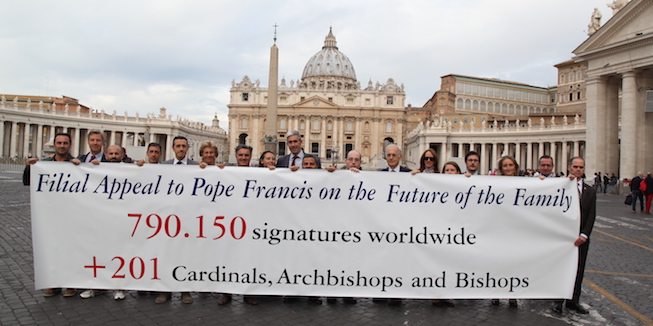Nearly 800,000 Sign Appeal Calling on Pope Francis to Clarify Church Doctrine

The “filial petition”, which has received 790,150 signatures since the appeal was launched in March, reflects concerns emanating from last year’s Extraordinary Synod.
The appeal expresses concern about “widespread confusion” arising from the possibility that “a breach” had been opened within the Church at last year's meeting, one “that would accept adultery—by permitting divorced and then civilly remarried Catholics to receive Holy Communion—and would virtually accept even homosexual unions when such practices are categorically condemned as being contrary to Divine and natural law.”
The signatories, who come from 178 countries on every continent, have appealed to the Holy Father to intervene with “a word” of clarification which, they argue, “is the only way" to prevent the "growing confusion among the faithful.”
“It would prevent the very teaching of Jesus Christ from being watered-down and would dispel the darkness looming over our children’s future should that beacon no longer light their way,” the petition states.
“Holy Father, we implore you to say this word”, the appeal continues. “We do so with a heart devoted to all that you are and represent. We do so with the certainty that your word will never disassociate pastoral practice from the teaching bequeathed by Jesus Christ and his vicars—as this would only add to the confusion.”
Jesus taught “very clearly” there must be “coherence between life and truth,” the appeal concludes. “He also warned us that the only way not to fall is to practice His doctrine.”
Last year's synod was criticized for sending out confusing signals, appearing to suggest that the Church's sacred teaching on marriage, the family and human sexuality was somehow "up for grabs".
The Pope chose not to enter into the debates in order to allow freedom of discussion, but the absence of any papal refutations of heterodox statements coming out of the synod, including some of the synod managers, only served to heighten the sense of confusion for many of the faithful.
The initiative’s spokesman, Professor Tommaso Scandroglio, said the Filial Appeal “has had widespread repercussions in the Italian and international press”.
These repercussions, the number of signatures collected and the number of personalities who have signed "indicate that a substantial number of believers are very worried about certain theological tendencies present in the Church today," he said.
Scandroglio, who teaches ethics and bioethics in the European University of Rome, added that the appeal “takes place constructively amidst the climate of discussion and dialogue regarding these subjects.”
Since the appeal began in March, the organizers have also published a handbook called Preferential Option for the Family—100 Questions and Answers relating to the Synod that aims to spread the teaching of the Catholic Magisterium on these matters. “Tens of thousands of copies of the handbook, authored by three bishops, have been requested from all over the world,” the organizers said.
Among the signatories are eight cardinals including Cardinal Jorge Medina Estévez, prefect emeritus of the Congregation for Divine Worship; Cardinal Geraldo Majella Agnelo, former primate of Brazil and secretary emeritus of the Congregation for Divine Worship in Rome; and Cardinal Gaudencio Rosales, Archbishop Emeritus of Manila.
In the U.S., signatories include Cardinal Raymond Leo Burke, Archbishop Timothy Broglio, and former senator Rick Santorum.
The petition has been rapidly gaining support, acquiring 300,000 signatures in just the last three weeks, but to have only eight cardinals out of a 219 in the College of Cardinals seems surprising, especially as the petition was simply calling for clarification of the Church’s teaching.
Scandroglio told the Register this was largely due to the technical way the petition was handled: it was difficult to get the cardinals to sign up online or get them to respond in other ways, he said, but also some chose not to sign “for reasons of prudence” as they “interpreted the petition as criticism of the Holy Father”.
He insisted this was not the intention, but that it was “in total harmony” with the Pope’s wish for discussion of these themes, and his call for “parrhesia” – to speak boldly and openly. Scandroglio said the organizers received “very few” complaints and only two that were “very negative”, one from an Italian daily newspaper, and another from a Greek bishop. Everyone else, he said, tended to show “appreciation” for the initiative.
Scandroglio said the Pope’s response to the petition, which was delivered to him today, is likely to be “informal” but the organizers will publish it if they receive it.
He added that they will wait and see how the upcoming synod proceeds before deciding on whether to begin any new initiatives.
















